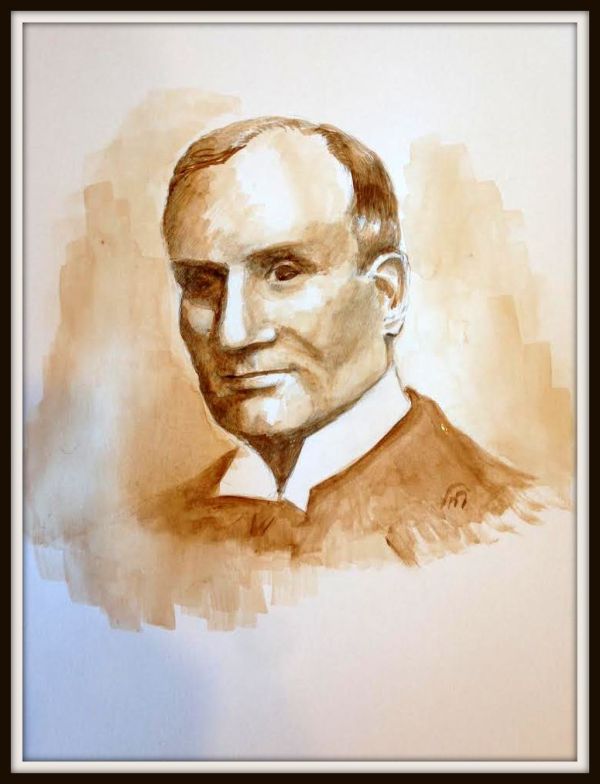CHARACTER STUDY – JUDGE WILLIAM H. WALLACE – taken from As One Must, One Can by Rochelle Wisoff-Fields (2016)
Judge William H. Wallace
Original Artwork © Rochelle Wisoff-Fields
With his elbow on the counter, he [Arel] rested his chin on his hand which he used to cover his left cheek. He waved his other hand over an official looking sheet of paper in front of him.
“What’s that?” Havah asked.
“It’s an indictment from His Honor Judge Wallace. I could go to prison.”
“What crime did you commit?”
“I’ve opened my shop on Sunday instead of Saturday.”
“And this is a crime?”
“According to him and his Sunday labor law, we’re required to observe the Christian Sabbath or pay a penalty. We may open our shops, but if we sell anything, we are in violation.”
“I don’t understand this man. Ulrich and Dr. Florin call themselves Christians and even go to church on Sunday. They are kind and gentle—nothing like that judge.”
A lump formed in the pit of Havah’s stomach. “Arel, you don’t suppose…” She envisioned the police smashing the window. They beat Arel with their clubs while he pled for mercy. Next they came after Rachel.
Havah shook off her grisly daydream and remembered her chance meeting with President Roosevelt at Ellis Island. Imagine, the ruler of the United States taking the time so speak with a Jewish peasant girl from Moldavia. Such a man would never allow another Kishinev or Odessa to happen in his great country.
She took the indictment in her hand and crumpled it in her fist. “Every ass likes to hear himself bray.”
Taken from As One Must, One Can (2016)
***
In this last book of the trilogy, Havah finds a formidable nemesis in Judge William H. Wallace who was described by the Kansas City newspapers as a crusader for the Sunday Blue Law. During his tenure as criminal court judge, he handed out over a reported 7,000 indictments. At odd times his deputies arrested cigar dealers, druggists, and even music conductors in the midst of performances if they fell on Sunday. No one was exempt.
One article quotes him as referring to the Jews as evil for their observance of Sunday on Saturday. It was only natural for Havah to fear a pogrom in her new country. She had experienced Antisemitism at its worst and recognized the signs.
***
This article, as written below, appeared in The Kansas City Journal, October 3, 1908
NOW HE TARGETS THE JEWS.
Judge Wallace Says Jews Must Keep Their Stores Closed on Sunday.
Not only is Judge Wallace going after the theater managers, pool hall proprietors, barber and tobacco dealers, but from now on his righteous wrath is to be visited upon the wicked citizens of Jewish extraction who keep their second hand clothing stores open on Sunday.
According to his special prosecutor it makes no difference to Judge Wallace that the religious belief of these dealers does cause them to observe Saturday as the Sabbath and that their places of business are tightly closed that day — they will be prosecuted just as vigorously if they open on Sunday.
When the Wallace Sunday closing crusade was started a statement was authorized by the court to the effect that provided the Jews of the city observed Saturday as Sunday they would be exempt from prosecution, but it is now stated that there has been a misconception as to this statement. Why the misconception has not been corrected before does not yet appear.
“Under the law,” said the court’s spokesman, “if the Jews observe Saturday as Sunday they are exempt from prosecution so far as labor is concerned, that is, they may work on Sunday; but this exemption does not allow them to sell goods and they are to be prosecuted if they do. Already two indictments for this offense have been found by the grand jury and the offenders will appear in court the first of next week.”
Therefore, if the Jew merchants of the city are so disposed, they may keep their stores open on Sunday, but if they sell anything, the heavy hand of the law will be laid upon them.
The explanation of the law as interpreted by Judge Wallace in this matter does not include a clear view of the fine distinction between what is called “work” and selling second-hand clothes.
That this new interpretation of the law will work a distinct hardship on the Jew dealer whose religious scruples will not allow him to do business on Saturday goes without saying for it effectually shuts him off from selling his goods on two days out of seven.
“I think the Sunday law will be pretty generally observed tomorrow,” said the special prosecutor. “In fact, I think 98 per cent of the places which have heretofore been in the habit of doing business on Sunday will be found closed. The grand jury will proceed with its work Monday morning, at which time the rest of the theater managers whom we did not have time to arraign this week will be brought into court.
Published by Argus Publishing
Represented by Loiacono Literary Agency
